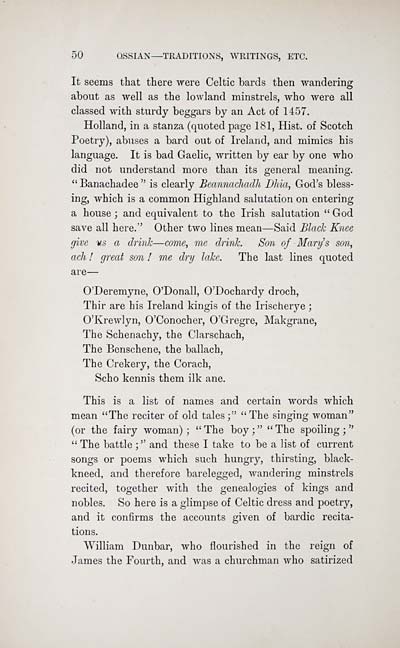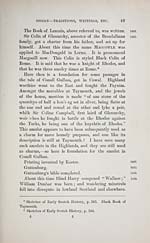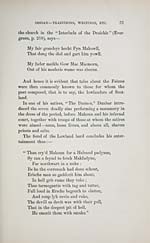Download files
Complete book:
Individual page:
Thumbnail gallery: Grid view | List view

50 QSSIAN — TRADITIONS, WRITINGS, ETC.
It seems that there were Celtic bards then wandering
about as well as the lowland minstrels, who were all
classed with sturdy beggars by an Act of 1457.
Holland, in a stanza (quoted page 181, Hist, of Scotch
Poetry), abuses a bard out of Ireland, and mimics his
language. It is bad Gaelic, written by ear by one who
did not understand more than its general meaning.
" Banachadee " is clearly Beannachadh Dhia, God's bless-
ing, which is a common Highland salutation on entering
a house ; and equivalent to the Irish salutation " God
save all here." Other two lines mean — Said Black Knee
give us a drink — come, me drink. Son of Mary's son,
ach ! great son ! me dry lake. The last lines quoted
are —
O'Deremyne, O'Donall, O'Dochardy droch,
Thir are his Ireland kingis of the Irischerye ;
O'Krewlyn, O'Conocher, O'Gregre, Makgrane,
The Schenachy, the Clarschach,
The Benschene, the ballach,
The Crekery, the Corach,
Scho kennis them ilk ane.
This is a list of names and certain words which
mean "The reciter of old tales;" "The singing woman"
(or the fairy woman) ; " The boy ; " " The spoiling ; "
" The battle ;" and these I take to be a list of current
songs or poems which such hungry, thirsting, black-
kneed, and therefore barelegged, Avandering minstrels
recited, together with the genealogies of kings and
nobles. So here is a glimpse of Celtic dress and poetry,
and it confirms the accounts given of bardic recita-
tions.
William Dunbar, who flourished in the reign of
James the Fourth, and was a churchman who satirized
It seems that there were Celtic bards then wandering
about as well as the lowland minstrels, who were all
classed with sturdy beggars by an Act of 1457.
Holland, in a stanza (quoted page 181, Hist, of Scotch
Poetry), abuses a bard out of Ireland, and mimics his
language. It is bad Gaelic, written by ear by one who
did not understand more than its general meaning.
" Banachadee " is clearly Beannachadh Dhia, God's bless-
ing, which is a common Highland salutation on entering
a house ; and equivalent to the Irish salutation " God
save all here." Other two lines mean — Said Black Knee
give us a drink — come, me drink. Son of Mary's son,
ach ! great son ! me dry lake. The last lines quoted
are —
O'Deremyne, O'Donall, O'Dochardy droch,
Thir are his Ireland kingis of the Irischerye ;
O'Krewlyn, O'Conocher, O'Gregre, Makgrane,
The Schenachy, the Clarschach,
The Benschene, the ballach,
The Crekery, the Corach,
Scho kennis them ilk ane.
This is a list of names and certain words which
mean "The reciter of old tales;" "The singing woman"
(or the fairy woman) ; " The boy ; " " The spoiling ; "
" The battle ;" and these I take to be a list of current
songs or poems which such hungry, thirsting, black-
kneed, and therefore barelegged, Avandering minstrels
recited, together with the genealogies of kings and
nobles. So here is a glimpse of Celtic dress and poetry,
and it confirms the accounts given of bardic recita-
tions.
William Dunbar, who flourished in the reign of
James the Fourth, and was a churchman who satirized
Set display mode to: Large image | Transcription
Images and transcriptions on this page, including medium image downloads, may be used under the Creative Commons Attribution 4.0 International Licence unless otherwise stated. ![]()
| Early Gaelic Book Collections > Matheson Collection > Popular tales of the west Highlands > Volume 4 > (66) |
|---|
| Permanent URL | https://digital.nls.uk/81487849 |
|---|
| Description | Volume IV. |
|---|---|
| Shelfmark | Mat.77 |
| Additional NLS resources: | |
| Attribution and copyright: |
|
| Description | Items from a collection of 170 volumes relating to Gaelic matters. Mainly philological works in the Celtic and some non-Celtic languages. Some books extensively annotated by Angus Matheson, the first Professor of Celtic at Glasgow University. |
|---|
| Description | Selected items from five 'Special and Named Printed Collections'. Includes books in Gaelic and other Celtic languages, works about the Gaels, their languages, literature, culture and history. |
|---|

